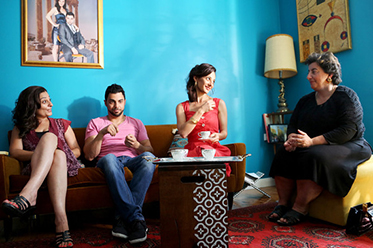 In a 2007 speech at Columbia University, Mahmoud Ahmadinejad, then president of Iran, famously proclaimed that there were no homosexuals in Iran. Despite the controversy that his words sparked, many Arabs and Muslims would still probably agree with Ahmadinejad’s assertion that homosexuality is a Western phenomenon and that the association of the words “Arab” and “queer” is an oxymoron.
In a 2007 speech at Columbia University, Mahmoud Ahmadinejad, then president of Iran, famously proclaimed that there were no homosexuals in Iran. Despite the controversy that his words sparked, many Arabs and Muslims would still probably agree with Ahmadinejad’s assertion that homosexuality is a Western phenomenon and that the association of the words “Arab” and “queer” is an oxymoron.
Is it possible that there are no gays in Iran? Are individuals with non-normative sexual identities absent from the Arab world too? Is there such a thing as Muslim gay, lesbian, or transgender communities? Where is the Arab, Muslim, Middle-Eastern LGBTIQ community?
The two-month program at the Queer Arab Film Festival, which launched this month in Sydney, provides many answers. I organised the festival – and I have long asked myself questions along these lines about the Arab, Muslim, Middle-Eastern LGBTIQ community.
Forgotten histories
As I undertook my research, I learned, much to my own surprise, that classical Arabic and Islamicate literature from the 9th to the 16th centuries was replete with examples of characters who engaged in same-sex behaviours.
I also discovered that homosexuality was more prevalent and socially tolerated — at times admired — than we may have expected. This was especially surprising considering how taboo the topic has become today in Arab and Muslim societies. Homosexuality encounters severe repression in most Muslim-majority societies today.
I learned about the ghulamiyyat of 9th-century Baghdad who cut their hair short, adopted masculine clothing, at times even painted moustaches on their faces, as a sign of sophistication and hopes of upward social mobility.
I read many medieval Arabic encyclopedias on erotic practices, a plethora of poems, tales and stories that have today long been forgotten, censored or heterosexualised.
If this is the rich, open and inclusive Islamicate literary history of homoeroticism, why is it that today homosexuality and lesbianism in Arab and Muslim societies, like all sorts of non-normative sexual orientations, continue to be overlooked? Why are LGBTIQ people assumed to be non-existent, and their acts and orientations viewed as “sins” imported from elsewhere?
How can we give a voice today to LGBTIQ individuals in our communities who do indeed exist and long to be safe, acknowledged, respected and loved?
Art holds up a mirror
In contrast to the silence that surrounds LGBTIQ issues across a large segment of contemporary Arab and Muslim societies, Arab film and literature give voice to these sensitive topics. These works challenge conventional views of gender and sexual norms in Arab and Muslim societies.
Over the last decade, increasing numbers of Arabic novels, short stories and poems have been published with gender variance as a central theme. Likewise, growing numbers of Arab and Middle-Eastern films and documentaries have been produced, featuring openly queer characters.
As an academic community, the Department of Arabic and Islamic Studies at the University of Sydney has a social and ethical responsibility to highlight the diversity of Arab and Muslim societies. We can work to correct misunderstandings and presuppositions about sexual minorities. We can help open a conversation about the personal, political, social and cultural struggles of Arab and Muslim LGBTIQ individuals who live, often silently, in our midst.
The Queer Arab Film Festival launched last week at Sydney University. We invite the public at large to screenings every Wednesday afternoon until the end of October 2014. This festival is a safe academic forum in which to raise awareness about the Arab and Muslim LGBTIQ community in Australia and around the world.
Our festival includes both documentaries and feature films. Together these give voice to the real, lived experiences of Arab and Muslim gay and lesbian individuals.
It includes a selection of films from a range of Arab (Egypt, Tunisia, Morocco, Lebanon, Palestine) and Muslim-majority (Iran, India) and Muslim-minority societies (South Africa, USA, Australia).
In addition, because this film festival is taking place in Australia, I have included the two seasons of the TV web series “I LUV U BUT…” (2013-2014) by Fadia Abboud, and the short film “Lesbanese” by Alissar Gazal (2004). Both filmmakers, originally from Lebanon and now residing in Sydney, will attend the October 15 screening and participate in a round-table discussion about the struggles of the Arab LGBTIQ communities in Australia.
Each of the 11 films to be screened at the Queer Arab Film festival is introduced by an academic from the University of Sydney or a by a visiting scholar. All screenings will be followed by discussion.
Despite the rising number of scholarly writings that tackle this controversial topic, there has never been, to my knowledge, a queer Arab film festival inside or outside the Middle East. Although there’s a higher level of awareness of queer Arab cinema in the gay community, screenings have not necessarily involved the wider community.
Our festival aims especially to break the silence around LGBTIQ people in our communities. We seek to create a non-judgemental space for dialogue about the much-overlooked – and greatly misunderstood – subject of gay and lesbian sexualities and same-sex identities in Arab and Muslim societies today.
The Queer Arab Film Festival runs until October 22. Details here.
A right to exist: Australia’s first Queer Arab Film Festival launches
By Sahar Amer, University of Sydney – Sahar Amer is the organizer of the Queer Arab Film festival.
This article was originally published on The Conversation. Read the original article.
Image: I LUV U BUT… – photo by Fatima Mawas
